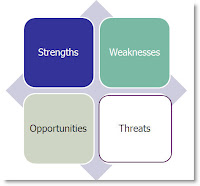SWOT Analysis is a popular term in management. It is a technique used to identify the internal strengths and weaknesses and the external opportunities and threats of a business. The SWOT analysis commonly helps an organization to devise appropriate strategies in order to capitalize its strengths, eliminate its weaknesses, utilize the opportunities and overcome the threats. This same technique can be a very valuable tool for individuals for making important career decisions.
An individual will first have to make an internal evaluation of oneself so as to identify one's strengths and weaknesses. In this process, he/she can also find out his/her likes and dislikes. This is important because nobody likes to get stuck in a career one hates. Once this is done the next step is to look at the external environment. What kind of jobs are on rise? What is the demand of the market? What are the technologies in use? What are the changes taking place and how rapid is the change? An external evaluation gives you a chance to figure out what works and what doesn't and also to identify the training needs in order to further bolster your strength.
Sadly what most people do is just look at the external environment in terms of opportunities and threats in order to make their career decisions. Most career choices are made on the basis of what's popular, what employers want and the level of return on investment. Very few people take a moment to actually identify their strengths and preferences. As a consequence, someone who's great with cooking might be pursuing a degree in business administration just because everyone else is doing it; someone who gets super anxious and nervous when interacting with people might be planning a marketing specialization because marketing jobs are on a rise; a great writer might be stuck working as an accountant or someone with great potential in fashion designing may decide to work as a bank teller.
Before you find out what professions and qualifications get greater opportunities in the market, it's important that you look inside yourself to determine what your strengths and weaknesses are. It is because you can turn even a threat into an opportunity with the right kind of talent. However, if you're weak in a certain area then no matter how big the opportunity is, you'll not be able to succeed. Therefore, first ask yourself, "What am I good at?" and "What do I love doing?" before you ask, "What kind of degree guarantees a high-paying job?" SWOT Analysis doesn't work if the first two important components are ignored in the evaluation process. Ignoring the Strengths and Weaknesses is a sure way for a strategic failure - both in decisions relating to business as well as the decisions relating to one's career.
An individual will first have to make an internal evaluation of oneself so as to identify one's strengths and weaknesses. In this process, he/she can also find out his/her likes and dislikes. This is important because nobody likes to get stuck in a career one hates. Once this is done the next step is to look at the external environment. What kind of jobs are on rise? What is the demand of the market? What are the technologies in use? What are the changes taking place and how rapid is the change? An external evaluation gives you a chance to figure out what works and what doesn't and also to identify the training needs in order to further bolster your strength.
Sadly what most people do is just look at the external environment in terms of opportunities and threats in order to make their career decisions. Most career choices are made on the basis of what's popular, what employers want and the level of return on investment. Very few people take a moment to actually identify their strengths and preferences. As a consequence, someone who's great with cooking might be pursuing a degree in business administration just because everyone else is doing it; someone who gets super anxious and nervous when interacting with people might be planning a marketing specialization because marketing jobs are on a rise; a great writer might be stuck working as an accountant or someone with great potential in fashion designing may decide to work as a bank teller.
Before you find out what professions and qualifications get greater opportunities in the market, it's important that you look inside yourself to determine what your strengths and weaknesses are. It is because you can turn even a threat into an opportunity with the right kind of talent. However, if you're weak in a certain area then no matter how big the opportunity is, you'll not be able to succeed. Therefore, first ask yourself, "What am I good at?" and "What do I love doing?" before you ask, "What kind of degree guarantees a high-paying job?" SWOT Analysis doesn't work if the first two important components are ignored in the evaluation process. Ignoring the Strengths and Weaknesses is a sure way for a strategic failure - both in decisions relating to business as well as the decisions relating to one's career.



.jpg)



